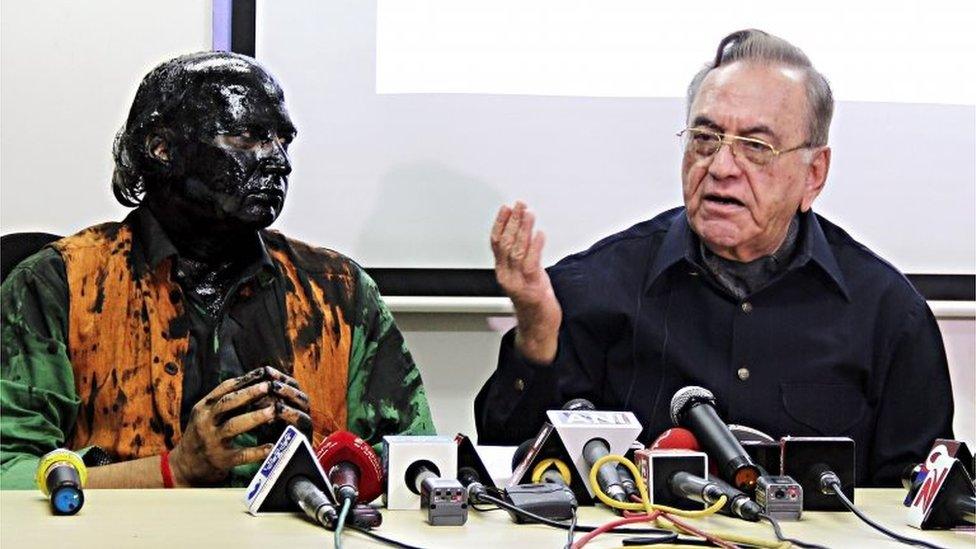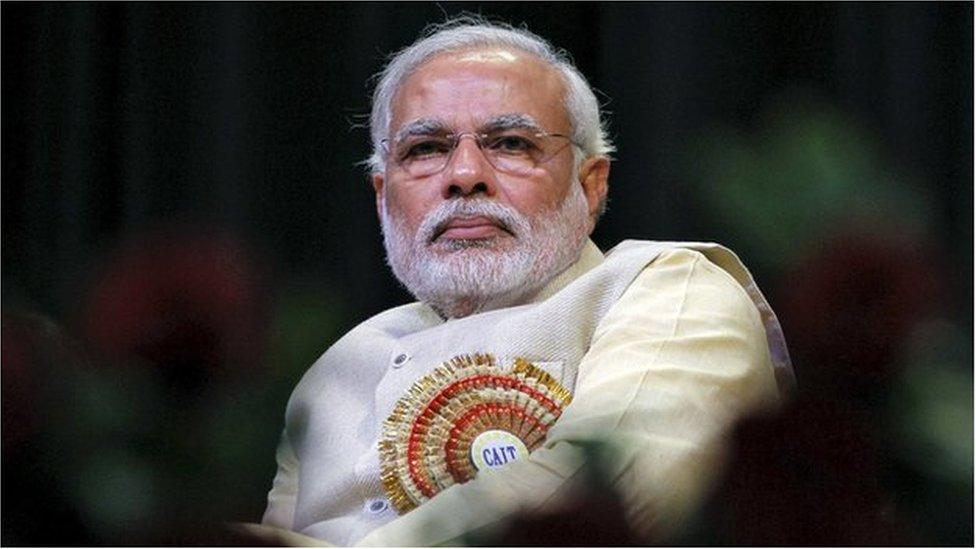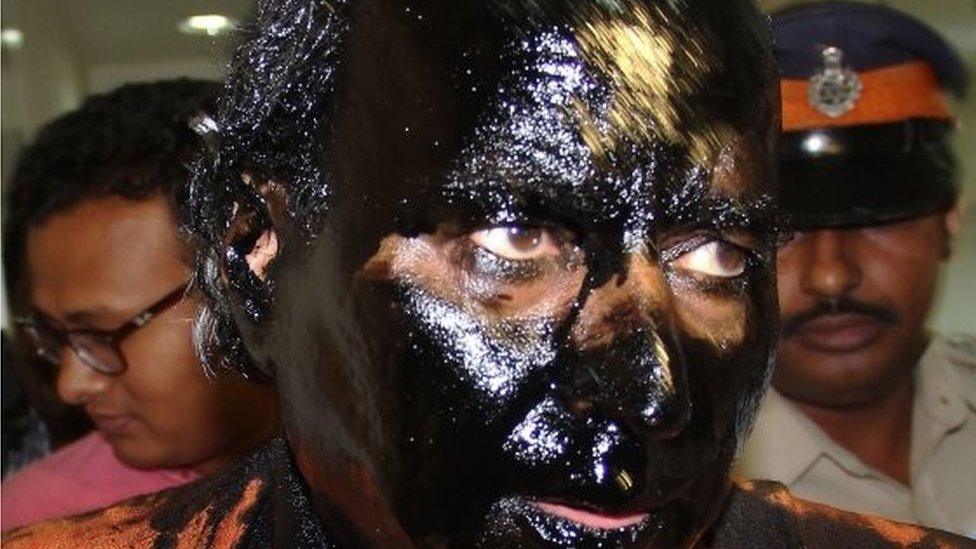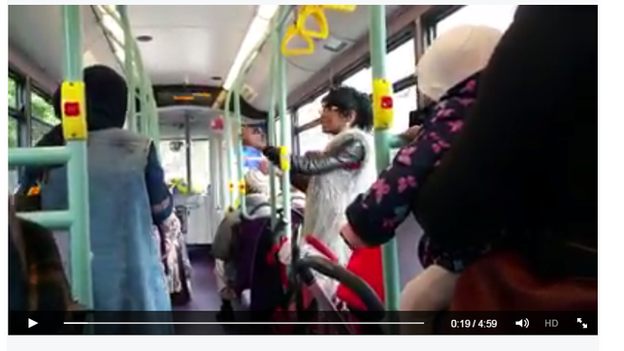A week of worrying about rising intolerance in India
- Published

The ink attack coincided with the book launch of ex-Pakistan foreign minister Khurshid Mahmud Kasuri (right)
As Indians worry about the rise of intolerance, powerful images like this one are affecting the debate.
It shows an Indian activist, Sudheendra Kulkarni. He was violently doused in ink in an attack by a stridently right-wing Hindu party. They were upset with him inviting over a former minister from India's traditional enemy, Pakistan. His name was used 36,000 times on Twitter.
Slick phrases can also affect the terms of an online debate. No less a literary figure than the writer Salman Rushdie pushed one this week. "Here come the Modi Toadies," he tweeted, external - railing against the most extreme online supporters of the Indian prime minister, who he said were abusing him after he joined in a protest by writers against the intolerance of Hindu right-wingers. Thousands then repeated the phrase.
These viral flashpoints were part of a conversation that convulsed much of India this week, both online and off. At the centre of it were more than 40 writers who returned a prominent literary prize to protest against rising intolerance. They are frustrated with the way the violent murder of an atheist writer, who had criticised Hindu belief, was handled. They're also upset with the banning of beef in some states and the murder of a Muslim man falsely accused, external of having beef in his fridge.
Behind it all is a disturbing question: is India becoming more openly, and indeed violently, intolerant - especially towards the Muslim minority, towards atheists and indeed anyone else that the Hindu right takes issue with?

The Indian internet debates intolerance
Monday 12 Oct: A striking photo of Sudheendra Kulkarni doused in ink drives his name into a worldwide top trend on Twitter.
Tuesday 13 Oct: Salman Rushdie tweets to support writers returning literary prizes, and says "thuggish" people, the "Modi Toadies", later abused him for it.
Thursday 15 Oct: Another prominent writer, Amitav Ghosh, trends on Twitter for criticising Narendra Modi's government for "tacitly" enabling violent attacks with its "failure" to act.
Later in the day, after Modi's Finance Minister Arun Jaitley criticises writers giving up their awards, the hashtag "rioters question writers", external trends with over 17,000 tweets. The trend was started, external by someone whose profile says they work for the opposition Indian National Congress.
Friday 16 Oct: Haryana Chief Minister Manohar Lal Khattar, from Modi's BJP party, trends on Twitter in India after saying, external Muslims living in India should give up eating beef.

For many Indian liberals, the answer is yes and the fact that it's happening under Narendra Modi, with his Hindu nationalist background, proves a point they've been making for years.

Author Salman Rushdie
Their argument is that Modi, who ran Gujarat state in 2002 when many people lost their lives in religious violence, is a divisive figure. But such accusations seem to have not, thus far, swayed mass public opinion: Modi and the BJP swept the polls last year.
Online too, Modi and the BJP have a huge and loyal following who argue that he is a unifying figure. The idea that Modi's India is a more intolerant place than what went before simply didn't stick for ages - so why is it going so viral just now?
Part of it is the sense of a changed moment. "Events in our country have led the liberal folk to question the government, put them on the spot, in a way that they couldn't have over the past year and a half," says well-known online liberal Akkar Patel, who works for Amnesty International but spoke to us in a personal capacity. "They've used the moment quite well."
The recent violent acts certainly give liberals the ammunition they need to get a conversation about intolerance trending. "When it comes to be that a man is killed after the government starts to ban cow slaughter, I think that gives us a moment to use against the people who are trying to divide the country using faith. And I think the web has given people a tool for people to reach out," says Patel.
Modi's supporters give these arguments short shrift. They deny that intolerance is rising, or that incidents such as the murder over beef are a sign of things changing. "The incident is very unfortunate, shocking," says GVL Narasimha Rao, national spokesperson for the BJP. "But it is an isolated incident."

Indian Prime Minister Narendra Modi
He sees the narrative that has been trending this week - that intolerance is rising under Modi - as a false and manipulated one. "It's a part of a sinister conspiracy, and it's not happening for the first time in this country," he says.
He points out that there were several outbreaks of religious violence during the last, Congress-led, government too, and that many of the recent events have happened in states not run by the BJP.
Despite the fact that many of the writers - like Salman Rushdie with his one million Twitter followers - are apolitical, he says that in fact online activists from opposition parties are driving this week's trends. It's true that Congress and other party activists are tweeting furiously. "They cannot digest the fact that a leader like Narendra Modi who comes from a very unprivileged background... has challenged the might of the Nehru Gandhi dynasty," he argues.
So who is right?
Well, there certainly wasn't a shortage of religious intolerance before Modi was elected - for example, 82 people died in religious riots in 2013. On the other hand, a national newspaper reported, external recently that, according to central government data, there were 287 incidents of "communal violence" in the first five months of this year, when Modi's BJP party was in power. In the same period last year, there were 232 incidents.

Sudheendra Kulkarni was later treated in hospital to remove the ink
It's hard to be definitive about the issue of tolerance. Indian politics - especially those around communal tension - are complicated. Sudheendra Kulkarni, whose face was doused in ink for talking to a Pakistani, was attacked by members of the Shiv Sena, a right-wing Hindu group in Modi's ruling coalition. But he himself used to be a member of Modi's own party - the BJP.
Still, the spreading of that image, of the names of writers renouncing their prizes, and phrases like "Modi Toadies" imply that in the ephemeral world of social media at least, the debate about intolerance is now very real - and very serious.
Reporting by Aditi Mallya
Next item: Black woman's racist rant on a London bus

Footage showing a woman's anti-Muslim tirade on a London bus has prompted a discussion about the fact that the abusive woman is black. READ MORE
You can follow BBC Trending on Twitter @BBCtrending, external and Facebook. All our stories are at bbc.com/trending